What Can Cause Mental Confusion In Adults?
What can cause mental confusion in adults?
Before answering that question, we first need to understand what mental confusion is.
So, what is mental confusion?
Mental confusion, also referred to as cognitive disconnection, is a condition where your mind feels clouded, and clear thinking becomes difficult, causing everything from memory lapses to difficulty in making decisions or following a conversation.
Mental confusion is a disorienting state in which a person struggles to process information, loses the ability to think clearly, and may feel disconnected from their surroundings.
This condition can manifest in a variety of ways, which include:
- Inability to focus
- Difficulty making decisions
- Feeling lost even in familiar environments
- And trouble understanding what is happening around them
Note that mental confusion is not the same as occasional forgetfulness due to distractions. It is not simply about losing track of your thoughts or misplacing your keys.
The mental confusion issue I am talking about here relates to a cognitive disruption that signals the onset of more significant health concerns.
What Are The Causes Of Mental Confusion?
Mental confusion may be caused by:
- Excessive stress
- Excessive fatigue
- Sleep deprivation
- Neurological disorders
- And environmental toxins and pollutants
Other causes of mental confusion include:
- Infection in the brain due to illness (e.g. Cerebral Malaria)
- And certain nutritional deficiencies
Particularly in elderly individuals or those with weakened immune systems, mental confusion can sometimes be the first indication of an underlying condition that requires medical attention.
This highlights the need to dig deeper when confusion becomes noticeable, especially when accompanied by other signs of deteriorating health.

What Can Cause Mental Confusion: Cerebral Malaria
According to the World Health Organisation (WHO), just four African countries accounted for over half of malaria deaths worldwide.
Guess what.
Of these four African countries, Nigeria was number 1.
Nigeria accounted for about 26.8% of worldwide malaria deaths.
That means Nigeria had the highest malaria deaths in the world!
That is food for thought the next time you as a Nigerian living in Nigeria has malaria.
Bottom line.
Malaria can kill you if you don’t take it seriously.
However, malaria is not one of the causes of mental confusion.
What can cause mental confusion is cerebral malaria.
What is cerebral malaria?
Cerebral malaria is a severe form of malaria that affects the brain.
Cerebral malaria can lead to various neurological symptoms, including:
- Confusion and altered mental status
- Seizures
- Cognitive impairment
- And coma
These symptoms result from inflammation and swelling in the brain, as well as the accumulation of malaria parasites and their toxic by-products.
The condition can disrupt normal brain function and lead to cognitive disconnections, including difficulties with thinking, memory, and perception.
Immediate medical treatment is crucial to manage cerebral malaria and minimise long-term neurological damage.
Guess what.
When an adult is experiencing cognitive decline, cerebral malaria is not the first diagnosis that comes to mind.
However, if you live in a country like Nigeria where malaria is commonplace (and poverty is prevalent), the connection between cerebral malaria and cognitive decline cannot be ignored.
Bottom line.
If someone you love is experiencing mental confusion, do not simply dismiss it as an inconvenience, especially if the person in question has had recent episodes of recurring malaria.
Starting today, recognise mental confusion as a possible symptom of a bigger illness. And if you do, you could ultimately save lives.
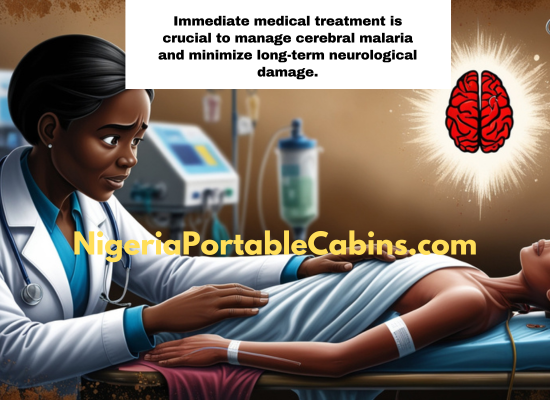
The Problem With Mental Confusion
What makes mental confusion particularly concerning is its subtlety.
It can sneak up on someone gradually, and because of this slow onset, it's often overlooked or misattributed to normal aging, stress, or fatigue.
However, mental confusion should be viewed as a red flag, a signal from the brain that something is out of balance.
Some people may dismiss mental confusion episodes as minor inconveniences, but persistent or recurring confusion is a sign that the body or mind is struggling with a deeper issue that requires attention.
So, act quickly when someone you love has repeated episodes of mental confusion. Or has a mental confusion that seem to be permanent and that refuses to subside.
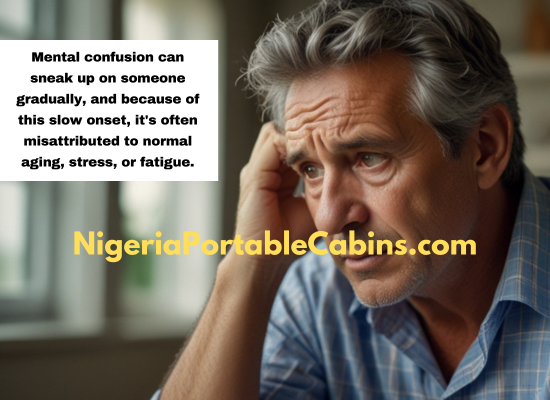
Cognitive Disconnection: More than Just Foggy Thinking
Cognitive disconnection (or cognitive disruption) is a term that perfectly encapsulates what happens when someone experiences mental confusion.
Imagine your brain as a network of electrical circuits constantly firing to help you make sense of the world around you.
When cognitive disconnection (or cognitive disruption) occurs, these circuits are interrupted, leading to:
- Scattered thoughts
- Inability to connect ideas logically
- And difficulty in responding to even the simplest of tasks
In simple words:
Cognitive disconnection results in impaired communication between different parts of the brain, which can lead to confusion, impaired thought processes, or difficulty with understanding and decision-making.
Illnesses that cause mental confusion as a result of cognitive disconnection include:
- Alzheimer's Disease: A progressive neurodegenerative disease that leads to memory loss and cognitive decline.
- Vascular Dementia: Dementia caused by damage to the blood vessels in the brain, leading to impaired cognition and memory.
- Schizophrenia: A severe mental disorder characterised by distorted thinking, delusions, and impaired cognitive functions.
- Multiple Sclerosis (MS): An autoimmune disease that affects the central nervous system, leading to cognitive and neurological disruptions.
- Traumatic Brain Injury (TBI): Injuries to the brain caused by external forces, which can result in cognitive impairments and confusion.
- Parkinson's Disease: A neurodegenerative disorder that affects motor control and can also lead to cognitive decline.
- Frontotemporal Dementia: A group of disorders caused by progressive damage to the frontal and temporal lobes of the brain, affecting behaviour and language.
- Bipolar Disorder: A mood disorder characterised by extreme mood swings, which can also impact cognitive functions and cause confusion.
- Lewy Body Dementia: A type of progressive dementia that involves abnormal protein deposits in the brain, leading to cognitive and motor symptoms.
- Epilepsy: A neurological disorder characterised by recurrent seizures, which can affect cognitive functions and lead to confusion or memory issues.
- Severe Depression: Major depressive disorder can impair cognitive function, leading to difficulty concentrating and memory problems.
- Stroke: A stroke, or cerebrovascular accident, can cause sudden cognitive impairments depending on the affected brain region.
- Cerebral Malaria: A severe complication of malaria that affects the brain.
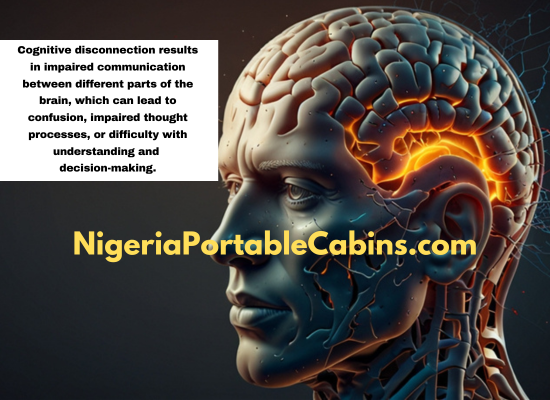
What Does Cognitive Function Mean?
The previous section mentioned several things that can cause cognitive disconnection, which leads to mental confusion and cognitive function impairment.
Consequently, you may wonder:
“What does cognitive function mean?”
Cognitive function refers to how well your brain works when it comes to things like thinking, remembering, solving problems, and making decisions. It is how your brain helps you understand and interact with the world around you.
To help you appreciate what cognitive functions are, pause for a moment and imagine your brain is like a computer.
This computer processes information, solves problems, and helps you think and learn.
Below are ten cognitive functions your brain performs effortlessly when your brain is healthy.
- Attention: The ability to focus on specific information while ignoring distractions.
- Memory: The capacity to encode, store, and retrieve information.
- Perception: The process of interpreting sensory information.
- Language: The ability to communicate through spoken or written words.
- Executive Function: The higher-order cognitive processes involved in planning, decision-making, and problem-solving.
- Learning: The acquisition of new knowledge and skills.
- Reasoning: The ability to draw logical conclusions from information.
- Problem-Solving: The process of identifying and resolving issues.
- Creativity: The ability to generate novel ideas and solutions.
- Social Cognition: The ability to understand and interact with others.
These 10 cognitive functions are essential for our daily lives, as they enable us to learn, think, communicate, and interact with the world around us.
Now pause for a moment and imagine a man or woman suffering from mental confusion due to cognitive disconnection.
That means the person’s brain will have trouble executing the cognitive functions listed above.
What a miserable life that will be!
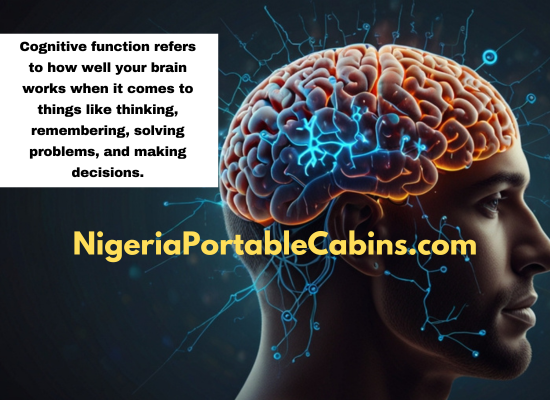
Mental Confusion And Nutritional Deficiencies
Another cause of mental confusion is nutritional deficiencies.
For instance, a lack of essential vitamins like B12 or folate can disrupt normal brain function, leading to cognitive difficulties that resemble more serious neurological conditions.
Despite being easily preventable with proper nutrition or supplementation, these deficiencies are frequently overlooked by healthcare providers.
This is especially true in elderly individuals, whose ability to absorb nutrients may decrease with age, making them more susceptible to confusion linked to diet rather than dementia.
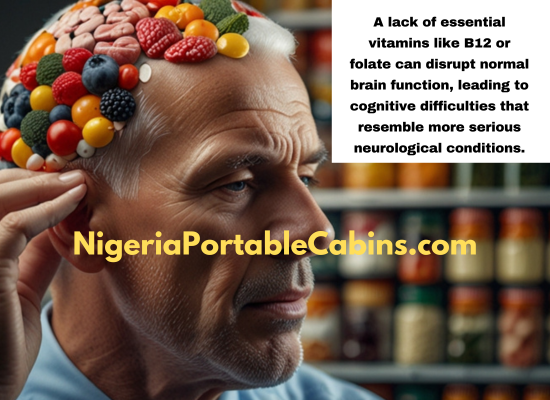
Mental Confusion And Infections
Another seldom-discussed cause of mental confusion is infection.
While we typically associate confusion with illnesses like Alzheimer's or stroke, various infections, particularly those that affect the brain, can lead to cognitive disconnection.
In regions where malaria is endemic, cerebral malaria is a particularly dangerous infection that often results in severe confusion and disorientation.
The parasite can cross the blood-brain barrier, leading to swelling and neurological damage, which manifests as cognitive disruption.
Although not often discussed in everyday conversations about mental confusion, understanding cerebral malaria’s role in cognitive impairment can be life-saving in parts of the world like Nigeria where this disease is prevalent.
Cognitive disconnection caused by infections in the brain can feel like a complete breakdown of mental coherence.
It's as if the brain’s wiring has become tangled, preventing thoughts, memories, and sensory input from connecting in the way they should.
This can lead to feelings of being “lost” within one's own mind, making even basic tasks seem insurmountable.

Environmental Toxins and Pollutants
Another under-discussed factor in mental confusion is exposure to environmental toxins and pollutants.
Heavy metals such as lead, mercury, and arsenic can accumulate in the body over time, leading to neurological damage and cognitive issues.
These toxins disrupt the brain’s ability to function properly, and even low-level exposure over time can result in confusion, memory problems, and difficulty concentrating.
Similarly, certain chemicals found in everyday products like cleaning agents or pesticides may contribute to cognitive disconnection if exposure is prolonged or at high levels.
Unfortunately, the effects of these toxins on cognitive health are rarely considered by healthcare professionals unless severe poisoning is suspected.
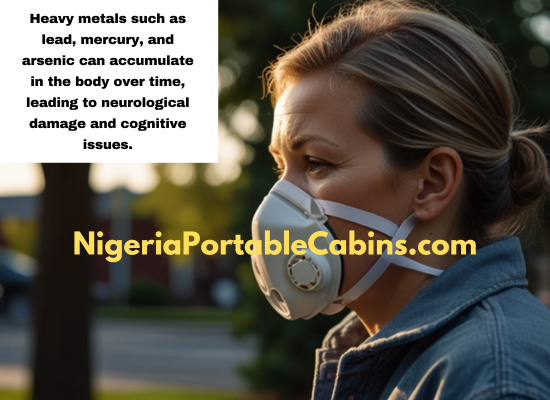
Cerebral Malaria As A Cause of Mental Confusion
Cerebral malaria, a severe neurological complication of malaria caused by the Plasmodium falciparum parasite, is an often-overlooked cause of mental confusion.
Yes, malaria is widely recognised as a dangerous disease.
However, its potential to cross into the realm of cognitive disruption remains under-discussed, especially in regions where malaria is not endemic.
Yet, for those exposed to this life-threatening condition, cerebral malaria poses a unique risk to brain function, leading to symptoms that can include disorientation, cognitive disconnection, and, in extreme cases, coma.
The neurological impacts of cerebral malaria often linger long after the infection is treated, making it a significant contributor to persistent mental confusion.
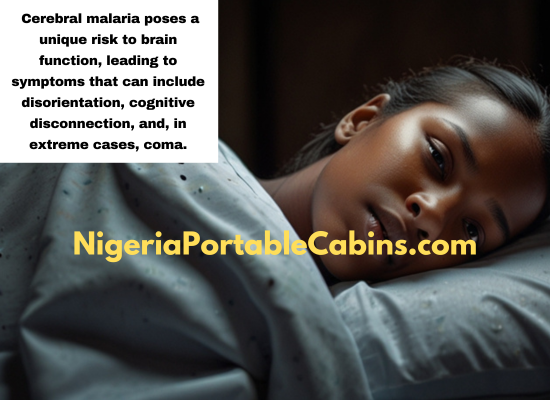
How Cerebral Malaria Affects the Brain
Cerebral malaria occurs when the malaria parasite invades the brain, disrupting the blood-brain barrier and causing inflammation.
This inflammation leads to swelling, increased intracranial pressure, and, in severe cases, brain haemorrhaging.
These physiological changes are catastrophic for brain function, leading to a breakdown in communication between neurons.
This is what causes the mental confusion often seen in patients suffering from cerebral malaria.
What makes cerebral malaria particularly dangerous is its speed.
Symptoms can escalate rapidly from fever and headache to severe disorientation and confusion.
In fact, one of the hallmark signs of cerebral malaria in adults is a sudden, profound cognitive decline.
Cerebral malaria patients may lose the ability to think clearly, respond appropriately to their surroundings, or even recognise loved ones.
This cognitive disconnection often takes the form of an inability to focus, a disjointed sense of time, and severe disorientation that can mimic other neurological conditions.
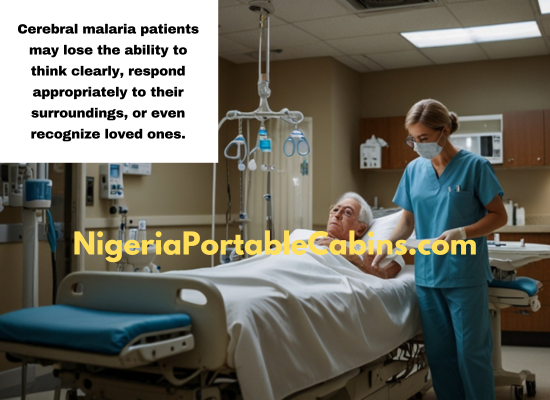
Cerebral Malaria Symptoms: What to Watch For
The symptoms of cerebral malaria, while severe, are not always immediately recognized as signs of neurological involvement.
In adults, early symptoms may include high fever, muscle aches, headaches, and nausea — symptoms that are easy to mistake for a regular flu or other common illness.
However, when the parasite begins to impact the brain, more alarming symptoms emerge.
These symptoms can include:
- Seizures
- Hallucinations
- And a state of confusion
The state of confusion may be so intense that the cerebral malaria patient becomes unresponsive or unable to recognise their environment.
Cerebral malaria symptoms in adults are often described as “brain fog” or intense cognitive disconnection, where even basic thought processes become a struggle.
This state of mental confusion is not just a passing phase; it’s a direct result of the brain being attacked by the parasite.
If left untreated, the confusion can quickly escalate to coma, making early recognition and intervention critical.
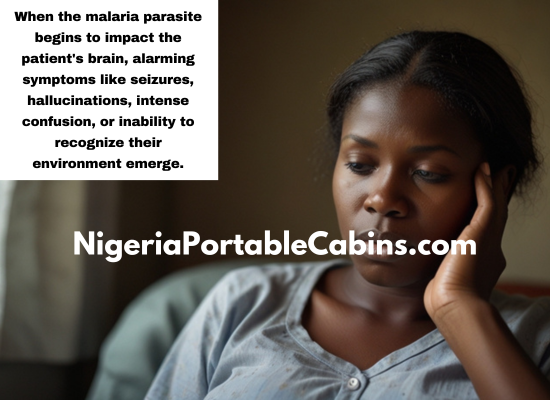
Long-Term Cognitive Effects of Cerebral Malaria
Even after successful treatment, cerebral malaria can leave lasting cognitive scars.
Survivors often report persistent mental confusion, memory problems, and difficulty with concentration long after the parasite has been cleared from their system.
This condition, known as post-malaria neurological syndrome (PMNS), highlights the long-term impact cerebral malaria can have on brain function.
Patients may experience mood swings, difficulty in cognitive processing, and a continued sense of mental disconnection — issues that are not always addressed in the follow-up care after malaria treatment.
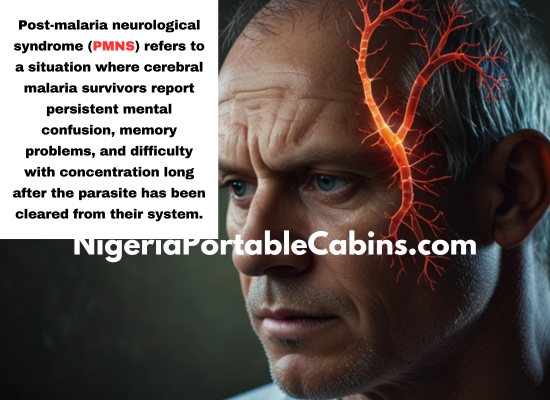
What makes cerebral malaria particularly insidious is that these long-term cognitive effects can often be mistaken for other conditions, such as post-traumatic stress disorder (PTSD) or generalized anxiety.
The emotional toll of surviving such a severe illness can compound the neurological damage, creating a cycle of cognitive impairment and mental distress that is difficult to break.
As a result, it’s crucial for both patients and healthcare providers to be aware of the potential for long-term mental confusion following cerebral malaria and to seek appropriate cognitive rehabilitation where necessary.
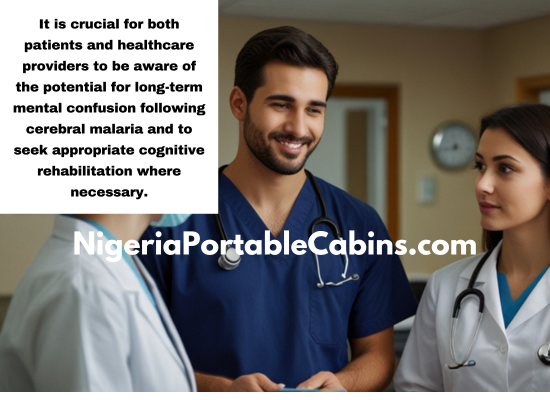
The Urgency of Early Diagnosis and Treatment
The key to preventing cerebral malaria from causing severe mental confusion and cognitive impairment lies in early diagnosis and treatment.
Malaria-endemic regions like Nigeria have a higher awareness of the risks, but cerebral malaria remains a hidden danger for travelers or expatriates who may not recognize the early signs of the disease.
Swift treatment with antimalarial medications can help prevent the parasite from reaching the brain and causing neurological damage.
However, it’s essential to monitor for any signs of mental confusion during and after treatment, as this can indicate that the infection has reached the brain.
The truth is:
Cerebral malaria may not be a daily concern for everyone, but it remains a potent and underappreciated cause of mental confusion for people in countries like Nigeria exposed to the Plasmodium falciparum parasite.
The ability of this parasite to attack the brain and cause long-term cognitive disruption should prompt greater awareness of its risks, especially in cases where mental confusion arises following travel to malaria-prone areas.
Recognizing the connection between cerebral malaria and cognitive disconnection is crucial for effective treatment and long-term recovery, ensuring that patients do not suffer prolonged mental confusion as a result of this dangerous infection.
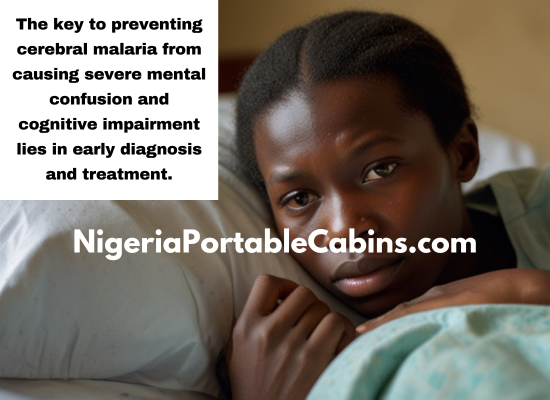
Cognitive and Emotional Disruption: Beyond the Physical Symptoms
Beyond the physical manifestations of cerebral malaria, adults often experience emotional and cognitive symptoms that are less discussed but equally important.
Emotional dysregulation is common, with individuals experiencing extreme mood swings ranging from apathy to anger or profound sadness.
These mood swings are not always easily connected to the illness itself, but they are a direct result of the brain’s inflammation and cognitive disruption.
Memory loss is another symptom that can persist throughout the illness and beyond recovery.
Cerebral malaria patients may struggle to remember recent events, conversations, or even basic information such as dates and names.
This type of memory loss can be mistaken for early-onset dementia in older adults, further complicating diagnosis and treatment.
Additionally, cerebral malaria can cause intense hallucinations.
These hallucinations may involve vivid, disturbing images or experiences that feel very real to the individual but are completely detached from reality.
Hallucinations, combined with severe mental confusion, often make it difficult for the patient to differentiate between reality and delusion, creating a sense of fear and isolation.
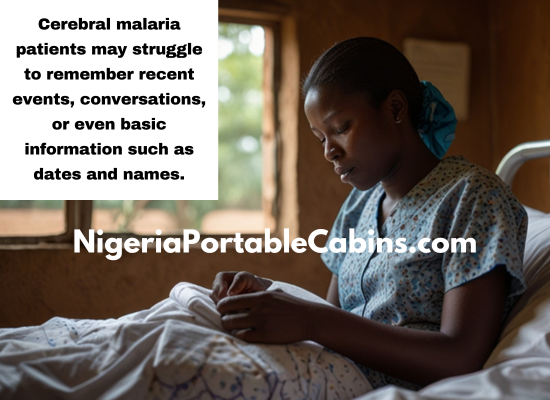
Cerebral Malaria: A Unique Challenge for Adults
Cerebral malaria presents a unique challenge in adults because its symptoms are not always immediately recognized as related to malaria.
This is particularly true for adults who have never contracted malaria before or are traveling in malaria-endemic regions without awareness of the risks.
For those already managing chronic health conditions, the symptoms of cerebral malaria may blend with other medical issues, making it even more difficult to pinpoint the true cause of their cognitive and neurological distress.
The key to successfully treating cerebral malaria lies in understanding the diverse range of symptoms it can cause and recognizing them early.
Immediate medical intervention is critical to stopping the progression of cerebral malaria before it causes irreversible damage to the brain and other vital organs.
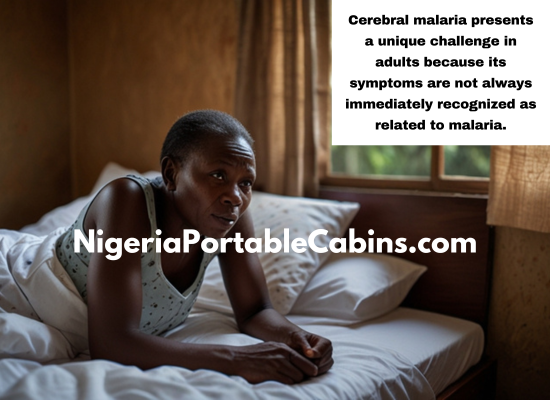
Early Warning Signs of Cerebral Malaria
In the early stages, cerebral malaria often presents symptoms that can be mistaken for other ailments.
These initial signs are typically subtle but can be key indicators of the parasite’s intrusion into the brain.
Adults might notice cognitive shifts such as:
- Difficulty concentrating
- Slow mental processing
- Or an overall sense of mental "fuzziness" (often described as cognitive disconnection)
Other early warning signs include headaches that escalate in severity, often described as migraines, coupled with nausea, fever, and fatigue.
These symptoms are easily misinterpreted as stress-related, a simple viral infection, or a side effect of dehydration, particularly in tropical climates like Nigeria where malaria is endemic.
However, when these signs are paired with mental confusion, they should be recognized as a possible precursor to cerebral malaria.
The onset of these cognitive disruptions may also be accompanied by mood swings, heightened anxiety, or irritability — emotional cues that the brain is struggling under the weight of infection.
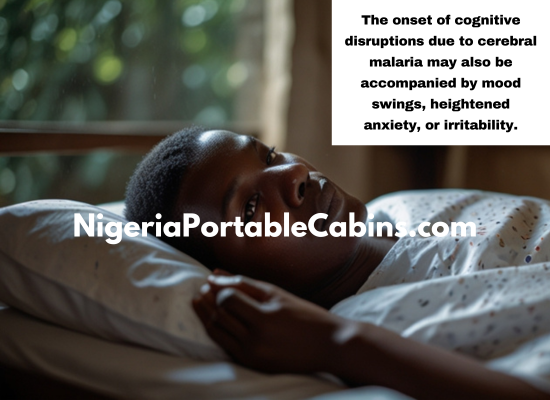
Neurological Red Flags: Escalation of Symptoms
As the infection progresses, the neurological symptoms of cerebral malaria become more prominent and concerning.
Disorientation is one of the earliest and most consistent signs.
Patients may begin to have...
- Difficulty recognising familiar environments
- May not understand basic instructions
- Or may exhibit behaviour that seems out of character, such as sudden forgetfulness or confusion about time and place.
In some cases, they may seem agitated or paranoid, exhibiting symptoms that could easily be mistaken for mental health disorders.
Seizures are a critical red flag in cerebral malaria.
These seizures may be partial or full-body convulsions, often occurring without prior history of epilepsy.
They signal that the brain is under attack from the malaria parasite, which has crossed the blood-brain barrier and is causing inflammation and swelling.
For adults, who are less likely to experience seizures as a common symptom of illness, this can be alarming and is often misattributed to stroke, hypertension, or other neurological disorders.
Recognising seizures as a symptom of cerebral malaria is vital for prompt diagnosis and treatment.
Another prominent symptom to be vigilant about is confusion that progresses into stupor or even coma.
This is an indication that the brain is experiencing increased intracranial pressure and swelling due to the parasite’s invasion.
If the patient becomes...
- Increasingly unresponsive
- Shows a diminished ability to follow conversations
- Or displays inappropriate responses
...these are clear signs of advanced cerebral malaria.
The transition from confusion to unconsciousness can happen swiftly, emphasizing the importance of immediate medical attention.
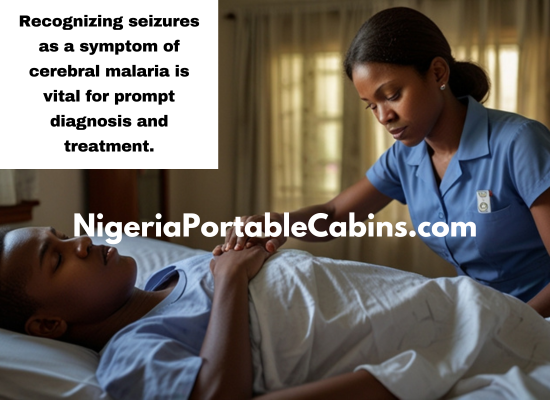
Persistent Symptoms of Cerebral Malaria: Memory Loss and Cognitive Decline
Even in cases where treatment is administered, cerebral malaria can leave long-lasting effects on the brain.
Memory loss is one of the most persistent symptoms, often continuing for months after the infection has been cleared.
Individuals may find themselves struggling with short-term memory lapses, forgetting recent events, conversations, or appointments.
This memory loss can resemble dementia-like symptoms, which is why it is critical to understand that cerebral malaria has both acute and chronic neurological impacts.
Cognitive decline can manifest as difficulty with problem-solving, decision-making, and processing information.
Adults recovering from cerebral malaria might experience slower mental responses and struggle with tasks that require critical thinking or multitasking.
The damage done to neural pathways can persist long after the infection has resolved, which makes rehabilitation and cognitive therapy essential components of recovery.
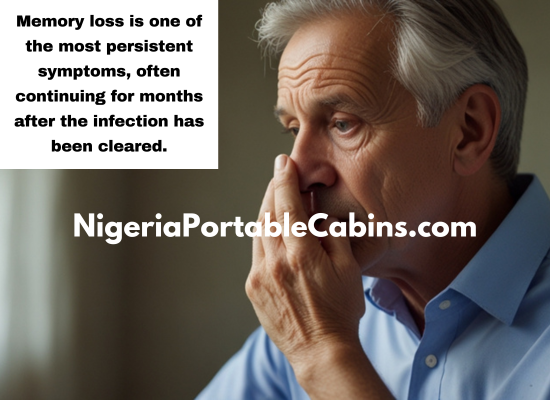
The Psychological Impact Of Cerebral Malaria
Cerebral malaria also bring psychological and behavioural changes.
Adult patients may experience mood swings that shift rapidly from anger to sadness, or they may feel overwhelmed by an unexplained sense of dread or depression.
These emotional disturbances are often linked to the inflammation and trauma that the brain endures during the illness.
Hallucinations and vivid nightmares are common, and these episodes can cause significant distress for both the patient and their caregivers.
In some cases, patients recovering from cerebral malaria report lingering symptoms of anxiety and paranoia, where the brain struggles to differentiate between reality and the lingering effects of the infection.
These symptoms can also mimic the effects of post-traumatic stress disorder (PTSD), making psychological support an important part of the post-recovery process.
It is essential that both medical professionals and caregivers remain alert to these emotional and behavioural changes, as they can deeply affect the recovery trajectory of cerebral malaria patients.
Recognising the diverse symptoms of cerebral malaria, from early cognitive disconnection to severe neurological and emotional distress, is essential for both preventing severe outcomes and supporting recovery.
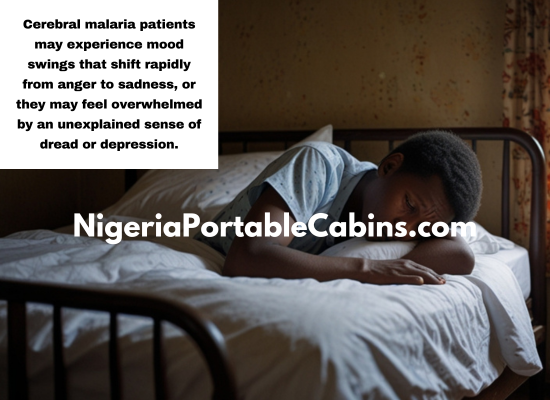
How to Treat Cerebral Malaria in Adults
Treating cerebral malaria in adults is an urgent, multi-faceted process that requires both immediate medical intervention and careful post-treatment care.
As one of the most severe complications of malaria, cerebral malaria can lead to permanent neurological damage or even death, if not treated swiftly.
The complexity of treating this condition goes beyond simply administering antimalarial drugs.
A successful treatment plan also involves:
- Addressing the brain’s inflammatory response
- Managing the systemic effects of the disease
- And offering long-term rehabilitation for cognitive and neurological recovery
The first and most critical step in treating cerebral malaria is rapid diagnosis and administration of antimalarial drugs.
In adults, this is often a race against time, as the disease progresses quickly and can lead to irreversible brain damage or coma within hours.
Intravenous anti-malarial drugs are the most commonly recommended treatment for severe cases of malaria, including cerebral malaria.
It works by directly attacking the Plasmodium parasites in the bloodstream, thereby reducing their numbers and mitigating their impact on the brain.
For adults presenting with severe symptoms like seizures, coma, or significant mental confusion, hospitalisation is required.
Intensive care is essential to monitor the patient’s vital signs and manage complications such as seizures, respiratory distress, or multi-organ failure.
In cases where patients exhibit signs of increased intracranial pressure, medical staff may administer medications to reduce brain swelling.
The goal in this acute phase is not only to kill the parasites but also to stabilise the patient’s neurological state and prevent further brain damage.
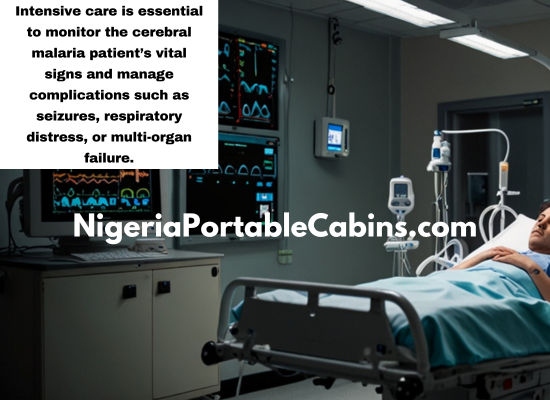
Addressing Cerebral Malaria Induced Brain Injury
Although the primary goal of treating cerebral malaria is clearing the parasite from the bloodstream, healthcare providers must also contend with the brain injuries caused by the infection.
The inflammation, swelling, and vascular blockages that characterise cerebral malaria can leave survivors with a range of neurological deficits.
The injury to the brain occurs not just due to the presence of the parasite but also as a result of the body’s immune response, which can exacerbate the damage to brain tissue.
Recent studies, such as those discussed in the Nature article, suggest that a multifaceted approach to treatment may be necessary to improve patient outcomes.
Adjunct therapies that address specific mechanisms of brain injury — such as anti-inflammatory treatments or medications targeting the blood-brain barrier — could play a crucial role in reducing the severity of long-term neurological damage.
The use of Magnetic Resonance Imaging (MRI) in understanding the pathophysiology of cerebral malaria is shedding new light on how the brain is affected by this condition, paving the way for more targeted therapeutic interventions.
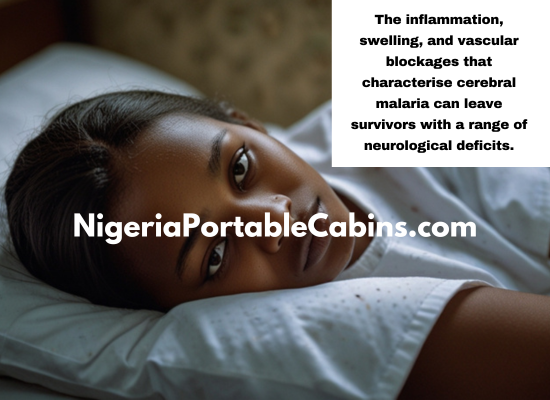
Managing Neurological Complications
The initial focus of cerebral malaria treatment is on eradicating the infection.
However, attention must also be given to the neurological complications that arise from the disease.
Adults suffering from cerebral malaria may experience prolonged seizures, profound confusion, or even paralysis during the course of the illness.
Therefore, anticonvulsant medications may be necessary to control seizures, and supportive therapies such as oxygen and fluid management can help reduce the strain on the brain and other organs.
The potential benefits of reducing brain swelling must be weighed against the risk of suppressing the immune system’s ability to fight off the remaining parasites.
Nonetheless, the brain’s inflammation is a key area of concern in treatment, as it contributes heavily to the neurological symptoms of cerebral malaria, such as confusion, seizures, and coma.
Nutritional support is also an essential part of treatment, particularly for adults who may have underlying health conditions or who have been weakened by the illness.
Ensuring proper hydration and electrolyte balance can be life-saving, as severe malaria often causes fluid imbalances that can lead to further complications.
Medical professionals must also educate caregivers of cerebral malaria patients of the need to ensure that patients receive adequate nutrition during recovery, which can help bolster the immune system and support cognitive recovery.
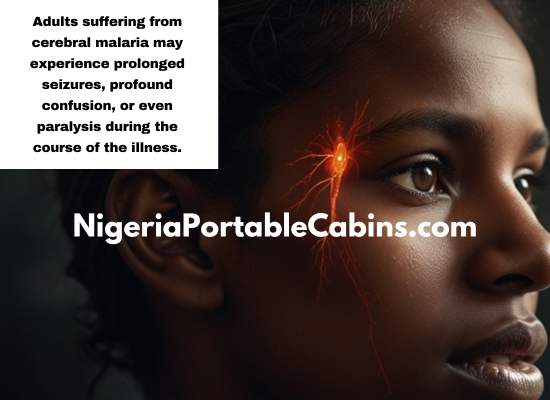
Recovery From Cerebral Malaria And Rehabilitation
Once the acute phase of cerebral malaria has been managed, the road to recovery begins — but this road can often be long and complex, especially for adults.
One of the most under-discussed aspects of cerebral malaria treatment is the need for comprehensive rehabilitation after the infection has been cleared.
While antimalarial drugs and immediate medical care are crucial, they are not the end of the story.
Many adults who survive cerebral malaria are left with lingering cognitive or neurological impairments, which can persist for months after treatment.
These cognitive or neurological impairments may include:
- Memory loss
- Difficulty concentrating
- And even changes in personality
Consequently, rehabilitation for cerebral malaria often involves cognitive therapy aimed at restoring mental functions such as memory, attention, and problem-solving skills.
Neurological therapy may also be necessary for those who have suffered motor impairments, such as difficulty walking or coordination issues, as a result of the brain damage caused by the infection.
Emotional and psychological support should also be considered a key part of post-treatment care.
Proper nutrition is essential to aid the brain's recovery and enhance overall physical health.
A diet rich in antioxidants, vitamins, and omega-3 fatty acids may promote brain health and support cognitive recovery.
Ongoing medications may be prescribed to address specific neurological symptoms or manage conditions such as seizures that persist post-recovery.
Adults recovering from cerebral malaria may struggle with anxiety, depression, or post-traumatic stress, especially after experiencing the disorienting effects of mental confusion, seizures, or coma.
Support from mental health professionals, combined with physical and cognitive rehabilitation, is essential for a holistic recovery.
There should also be follow-up appointments with healthcare providers to monitor neurological progress and adjust rehabilitation strategies as needed.
For those living in malaria-endemic areas like Nigeria or for individuals who frequently travel to these regions, preventative measures should be emphasised post-treatment to reduce the risk of recurrence.
This includes the use of antimalarial prophylaxis, mosquito nets, and repellents, as well as education on how to recognise the early signs of malaria for faster intervention in the future.
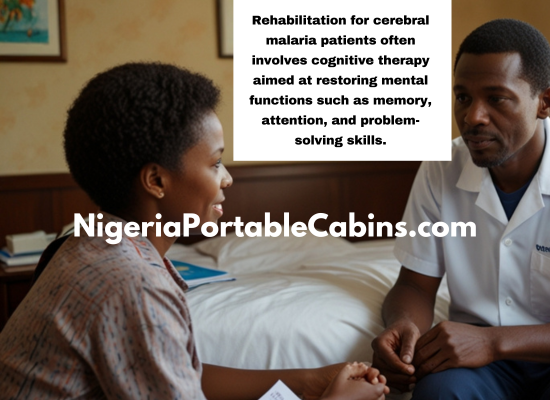
Prevention Of Cerebral Malaria And Health Maintenance
Prevention is always better than cure, especially when it comes to devastating conditions like cerebral malaria.
The best way to protect against this life-threatening disease is to prevent infection in the first place.
For cerebral malaria prevention, the goal is to minimise exposure to Plasmodium falciparum mosquitoes, but also to ensure that the body is fortified against potential infections.
This involves a combination of external preventive measures and internal health maintenance strategies that promote overall resilience.
The most well-known preventive measures for cerebral malaria focus on reducing exposure to the mosquitoes that carry Plasmodium falciparum.
These include:
- Insecticide-Treated Nets (ITNs): Sleeping under insecticide-treated bed nets remains one of the most effective ways to prevent mosquito bites, particularly in high-risk areas. These nets not only create a physical barrier but also repel mosquitoes due to the insecticide coating.
- Use of Repellents: Using mosquito repellents in your home can help reduce the likelihood of being bitten by mosquitoes during peak biting hours (dusk and dawn).
- Anti-Malarial Medications: For travelers or individuals living in malaria-endemic areas, taking prophylactic antimalarial drugs can significantly reduce the risk of contracting the disease.
- Environmental Control: Reducing mosquito breeding grounds, such as stagnant water sources around homes, can help decrease mosquito populations in affected areas, ultimately lowering transmission rates.
In addition to the above techniques for malaria prevention and treatment, it is recommended that individuals strengthen their immune system to enhance their body’s defence against malaria and cerebral malaria.
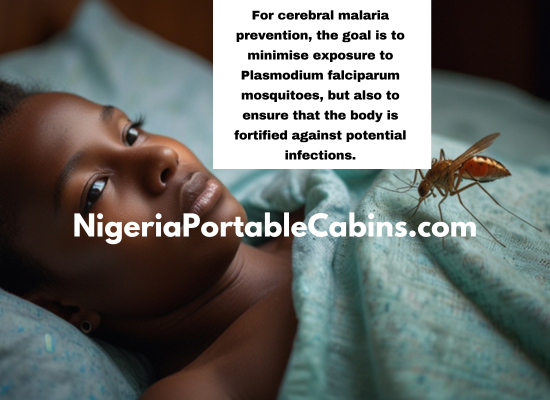
The Importance of Immune Health in Malaria Prevention
Many experts focus on mosquito control, but few emphasise the importance of internal health maintenance — specifically the role of the immune system — in preventing infections or mitigating their impact.
A strong immune system can potentially reduce the severity of a malaria infection and improve recovery outcomes.
Incorporating immune-boosting strategies into daily routines could be a key factor in bolstering the body’s defences against malaria.
These strategies include:
Diet Rich in Nutrients: A well-balanced diet rich in vitamins, minerals, and antioxidants is fundamental to maintaining a strong immune system. Foods such as leafy greens, berries, nuts, and seeds are packed with nutrients that support immune health.
Regular Physical Activity: Exercise has been shown to enhance immune function by promoting better circulation, which allows immune cells to move more efficiently through the body and respond to threats more rapidly.
Adequate Sleep: Quality sleep is crucial for immune health. During sleep, the body produces and releases cytokines — proteins that target infection and inflammation — making rest an essential aspect of preventing illness.
Stress Management: Chronic stress can weaken the immune system, leaving the body more susceptible to infections, including malaria. Practices such as meditation, mindfulness, and deep breathing exercises can help manage stress and support immune resilience.
Supplementation: Individuals at risk may benefit from targeted supplementation with immune-supporting nutrients such as vitamin D, zinc, and omega-3 fatty acids, all of which have been shown to enhance immune function.
Hydration and Detoxification: Proper hydration and detoxification can help maintain cellular health and support the body’s ability to fight off infections. Ensuring that the body is not burdened by toxins can make a significant difference in its ability to respond to infectious diseases like malaria.
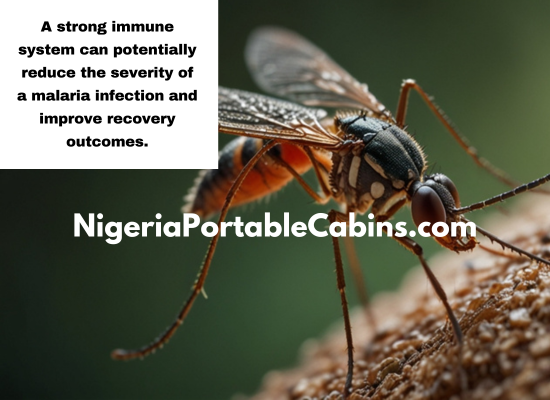
Nutrition and Immune Support
When it comes to preventing life-threatening conditions like cerebral malaria, one of the most powerful yet underappreciated strategies is leveraging the connection between nutrition and immune support.
Many discussions surrounding malaria prevention focus on external methods such as mosquito nets and antimalarial drugs while the role of diet in fortifying the immune system is seldom emphasized.
However, the body’s ability to fend off infections, recover from illnesses, and mitigate the severity of diseases like malaria is deeply intertwined with the nutrients we consume on a daily basis.
Nourishing the immune system through a carefully balanced diet provides essential tools for the body to defend itself.
This is particularly relevant for those living in or travelling to malaria-endemic areas where the risk of infection is higher, but it is equally important for anyone seeking to optimise their health and resilience to infections.
The foundation of good immune health is built on a variety of key nutrients that enhance the body’s ability to fight off pathogens, reduce inflammation, and repair damaged tissues — all of which play a critical role in the fight against diseases like malaria.

The Power Of Micronutrients In Immunity
Vitamins and minerals, often referred to as micronutrients, are vital components of a strong immune system.
Unfortunately, many individuals around the world suffer from micronutrient deficiencies without realizing it.
These deficiencies can leave the immune system weakened and less able to respond effectively to infections, including malaria.
Some of the most critical micronutrients for immune support include:
Vitamin D: Vitamin D plays a central role in activating immune cells that fight off infections. Studies have shown that individuals with adequate levels of vitamin D are less susceptible to infectious diseases.
However, vitamin D deficiency is common, especially in areas with limited sunlight exposure or among individuals with darker skin tones.
Foods rich in vitamin D, such as fatty fish (like salmon and mackerel), fortified foods, and egg yolks, can help boost levels of this essential vitamin.
Zinc: Zinc is a powerful immune-supporting mineral that helps with the production and activation of immune cells like T-cells and natural killer cells. It also has antioxidant properties that protect the body from inflammation and oxidative stress, which can be elevated during infections.
Zinc-rich foods such as shellfish, pumpkin seeds, and legumes can be an important part of a diet aimed at maintaining immune health.
Vitamin C: Known for its immune-boosting properties, vitamin C supports the production of white blood cells, which are essential for fighting infections.
Additionally, vitamin C acts as a potent antioxidant that helps neutralise harmful free radicals, reducing oxidative stress in the body.
Incorporating foods like citrus fruits, bell peppers, strawberries, and broccoli into the diet can significantly enhance vitamin C intake.
Selenium: Selenium is another often overlooked mineral that supports immune health by enhancing the production of antioxidant enzymes, which help reduce inflammation and oxidative damage.
Selenium is also critical in the formation of immune responses that protect against viral and bacterial infections. Brazil nuts, sunflower seeds, and fish are excellent sources of selenium.

Gut Health And Your Immune System
Another area that is often underexplored in the context of immune support is the connection between gut health and immune function.
The gut, home to trillions of microbes, plays a critical role in regulating the immune system.
Approximately 70% of the immune system resides in the gut, meaning that a healthy, balanced gut microbiome is essential for overall immune health.
A diet rich in fibre, probiotics, and prebiotics can promote a healthy gut microbiome, which in turn supports stronger immune responses.
Foods like yoghurt, kefir, sauerkraut, kimchi, garlic, onions, and whole grains provide the body with beneficial bacteria and the nutrients that feed them.
These beneficial microbes help train the immune system to recognise and respond to threats more effectively while also reducing inflammation.
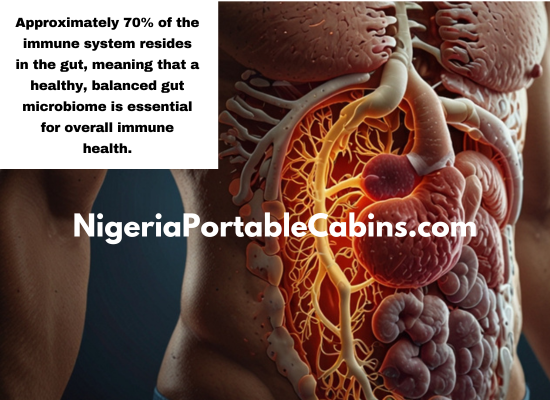
The Crucial Role of Antioxidants
Antioxidants are critical for protecting cells from oxidative damage, a common issue during infections like malaria where inflammation and cellular stress are high.
By neutralizing harmful free radicals, antioxidants help preserve the integrity of cells and prevent them from being compromised by oxidative stress.
Polyphenols, a type of antioxidant found in plant-based foods such as berries, green tea, dark chocolate, and red wine, are known for their ability to enhance immune function and protect against oxidative damage.
Incorporating polyphenol-rich foods into the diet can provide additional support to the immune system, particularly during times of increased exposure to pathogens.
Inflammation and the Role of Omega-3 Fatty Acids
Another often overlooked aspect of immune support is the role of inflammation and the importance of balancing pro-inflammatory and anti-inflammatory processes in the body.
Omega-3 fatty acids, found abundantly in fish like salmon, sardines, and flaxseeds, are well-known for their anti-inflammatory properties.
Chronic inflammation can weaken the immune system and increase susceptibility to infections, so ensuring adequate intake of omega-3s can help keep inflammation in check and bolster immune responses.
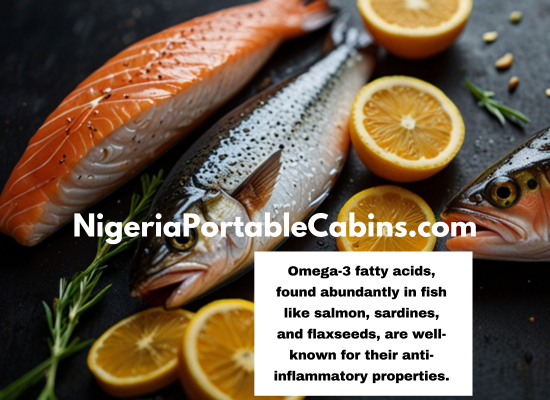
My Encounter With Cerebral Malaria
I had an encounter with cerebral malaria in April 2024.
Before then, I had treated malaria monthly for three months; January to March 2024.
I treated malaria once in January, once in February 2024, and twice in March 2024. That is, a total of four times in three months.
In April 2024, I noticed I was experiencing mental confusion.
For example, it often took me about an hour to brush my teeth because of persistent confusion and forgetfulness.
First, I will pick up my toothbrush. Then I will realise that I didn’t take the toothpaste. Then I will drop the toothbrush and start looking for the tooth paste.
When I finally find the tooth paste, I will start looking for the tooth brush. And when I finally found the tooth brush, I will start looking for the tooth paste I dropped somewhere while looking for the tooth brush.
That is how I would walk in cycles for one whole hour before I would finally have both toothbrush and tooth paste in my hands.
That was frustrating!
Guess what.
That was just the beginning.
Shortly thereafter, I started having vivid nightmares… terrifying dreams that frightened even me, someone who is not easily frightened.
Usually, I wake up between 5am to 5:30am every working day to start preparing for work.
But this time, I was moving from one nightmare to another nightmare, to another nightmare, and still another nightmare.
Consequently, my wake up time moved from 5:30am to 10am.
I was waking up by 10am almost every day in April 2024. And everywhere was dead quiet when I woke up because kids have gone to school, and working men and women have gone to their places of work or business.
“What is happening to me?” I wondered.
I dreaded going to sleep.
On top of that, I had no desire to do anything.
I had no desire to…
- Go to work
- Play music
- Sing (my favourite hobby)
- Cook
- And wash or clean
When I woke up, I would take a chair and sit within my premises wearing just boxers; no shirt, no trousers.
When I get tired of sitting, I will go inside and lie down. And when I get tired of lying down, I will come outside and sit.
I didn’t go anywhere the whole of April 2024.
I was in a confused state.
The malaria parasite has got to my brain, and I was in a state of cognitive disconnection.
My wife rushed me to a private hospital on April 30, 2024 when I became partially unconscious.
I went completely unconscious as the Uber driver pulled up in front of the private hospital in Lagos Nigeria.
The last thing I heard before becoming unconscious was someone shouting:
“It’s an emergency! It’s an emergency! It’s a stroke!”
Weeks later when I returned home after being discharged from the hospital, my wife told me she was in the emergency ward with me. She said at a point, I had seizures and I was foaming in the mouth.
Back to my story.
By the next day, May 1st 2024, the private hospital diagnosed me as having infection in my brain.
However, they told my wife they needed to transfer me to another hospital because beds were not available at the time in the ward where brain issues are treated.
So, I was transferred to a government hospital somewhere in Lagos Nigeria.
My mental confusion was so bad that when I became conscious, I couldn’t recognise my wife.
As she walked toward my hospital bed, I thought to myself, this woman looks like my wife.
When she stopped by my bed I asked her: “Are you Mrs. Itoje?”
Guess what.
I still had mental confusion even after I was discharged from the government hospital 17 days after I was first admitted.
My wife ordered an Uber ride to take us from the hospital to our home.
During the ride, she gave me bottled water to drink. She said I needed to drink a lot of water to ease the pain I felt when I urinated.
You know what?
I was afraid to drink the water because I was still not sure she was my wife.
I said to myself:
“This woman could be a kidnapper. She might just kidnap me if I end up sleeping off after drinking this water”.
So, I didn’t drink the water even though I was very thirsty.
On top of that, I was afraid to sleep even though I was feeling sleepy.
I wondered in silence:
“Do these people really know my house?”
Well, I didn’t have to wait long.
The Uber driver pulled up in front of my house about an hour and a half later.
Then I thought to myself:
“Oh, it looks like they know my house!”
The next day, as we sat opposite each other within our premises, I asked my wife:
“Are you Mrs. Itoje?”
Shocking, right?
Yes, even though I had received full treatment for the mental confusion caused by cerebral malaria, I was still in a confused state.
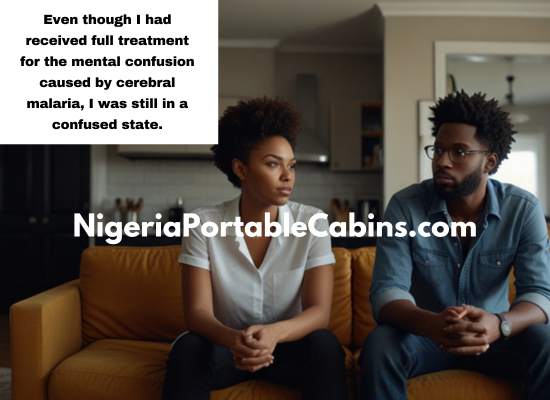
My Road To Recovery From Cerebral Malaria
My younger sister relocated me to her home two days after I was discharged.
She is a health and wellness coach as well as a supplement distributor.
She said to me:
“Your doctors have done their part. It is time for me to do my part and guide you on the road to recovery.”
She is a distributor of a supplement called STC30.
STC30 is a stem cell and antioxidant product manufactured by a Malaysian based company called SuperLife.
My sister was convinced that my health would improve significantly if I used STC30 for three months.
I followed her recommendation and commenced the use of STC30 immediately.
I started each day by brushing my teeth after waking up. Then I take one sachet of STC30 supplement. And drink one cup of water.
One of the usage instructions I was given by my sister is to take lots of water during the day, in addition to the initial cup of water I took immediately after using the STC30 supplement.
The second usage instruction I was given is this:
The STC30 supplement was to be poured bit by bit at the bottom of your tongue.
I was told that the essence of this usage approach is to ensure that the stem cell supplement gets directly into your bloodstream instead of going to your stomach.
Close your mouth and keep your tongue down until the small quantity of STC30 you poured under your tongue is absorbed into your bloodstream.
Then repeat the process.
Ideally, the small sachet of STC30 supplement should be poured under your tongue in bits about three to four times until the sachet is empty.
I followed these STC30 usage instructions religiously every day.
Guess what.
My mental confusion disappeared after 6 weeks of daily use of STC30.
In addition, the blurry vision I experienced after being discharged from the hospital cleared. And my vision became as sharp as it was before my illness started.
That was mind-blowing for me.
Frankly, I never expected that level of recovery from the mental confusion within that time frame.
In fact, my friend came over to greet me at my sister’s place a couple of days after she relocated me to her house. And he said it normally takes three to six months for brain cells to reconnect when a disease causes cognitive disconnections.
So, my mind was already tuned to three months of recovery.
Fortunately, SuperLife STC30 helped me recover from the mental confusion I experienced, post cerebral malaria treatment, in just six weeks.
The benefits of STC30 include the following:
Stem Cell Regeneration: STC30 supports the body’s natural stem cell regeneration, which can aid in the repair and maintenance of damaged tissues and organs.
Immune System Support: STC30 helps strengthen the immune system, enhancing the body’s ability to fend off infections and diseases.
Cellular Detoxification: It assists in detoxifying cells, which can improve overall health and energy levels by removing harmful toxins from the body.
Chronic Disease Management: The supplement may support the management of chronic conditions by promoting cellular health and reducing inflammation.
Cognitive Function: The supplement might enhance cognitive function and mental clarity, supporting better focus and memory.

Introducing The 90-Day Reclaim Vitality Protocol
A revolutionary new chronic disease management protocol for men and women over 40 that use core reset strategy to help you manage chronic symptoms, restore energy, and feel like yourself again without drastic lifestyle changes, strict diets, or relying solely on medications!
Now you can regain your vitality, boost your energy, and take control of your health without completely changing your lifestyle, without being stuck on medications forever, and without giving up the activities that bring you joy!
It might sound hard to believe, right?
After all you’ve probably tried to get your health back on track before but you’re still struggling.
It feels like too much to hope that this simple 90-day protocol could be the answer to managing your chronic symptoms and finally feeling like yourself again.
But this is unlike anything you’ve ever tried.
That’s because now relying on short-term medications, using generic plans that don’t work for you, and hoping things will just get better on their own—all that is in the past.
The "Chronic Disease Easy Switch"?
The 90-Day Reclaim Vitality Protocol was designed to make managing your chronic condition as easy as possible.
That’s why so many people just like you are calling it the “Easy Switch”.
But let’s be honest—success is never effortless.
However, I’ve made it as simple as possible, and I’m sure you’ll agree that’s more than fair.
The 90-Day Reclaim Vitality Protocol works so well because it includes:
A Stem Cell-Based Supplement
You’ll receive 6 packs of SuperLife STC30 stem cell therapy supplements, with a total of 90 sachets. These powerful stem cell therapy help your body repair and regenerate damaged tissues naturally.
This promotes long-term healing, improving your strength and energy over time, without relying on temporary solutions.
So instead of just treating symptoms for short-term relief, you’ll experience deeper, more lasting recovery as your body heals at the cellular level.
Daily Use for Consistent Progress
You’ll take one sachet a day for 90 days, ensuring your body receives continuous support.
This steady intake helps you gradually reduce symptoms, making it easier to regain control of your life.
So instead of dealing with the rollercoaster of good and bad days, you’ll feel more balanced and in control of your health.
Easy Morning Routine
The supplement is taken one hour before breakfast, making it a seamless part of your day.
No complicated instructions—just a simple routine that’s easy to stick with.
So rather than disrupting your day with complex routines, you can enjoy a smooth, simple way to start your morning, knowing you’re supporting your health.
Targeted Healing for Persistent Health Issues
This protocol is designed to tackle the underlying causes of your persistent health challenges.
Instead of only addressing surface symptoms, it helps promote deeper healing and recovery over time.
So instead of feeling stuck in a cycle of temporary fixes, you’ll enjoy long-term relief that helps you feel stronger and more capable.
Supports Natural Body Regeneration
SuperLife STC30 stem cell therapy boosts your body’s natural healing processes by promoting cellular regeneration.
This helps you feel improvements gradually without the need for harsh medications or invasive treatments. So instead of fearing side effects from medications, you’ll restore your health naturally and safely, allowing your body to heal in its own time.
Long-Term Benefits Over Short-Term Symptom Relief
Unlike medications that provide temporary relief, this protocol focuses on long-term recovery.
You’ll stop worrying about constant flare-ups and finally enjoy a more stable, healthier life.
So rather than just managing symptoms with no lasting solution, you’ll experience real, sustainable improvements in how you feel day-to-day.
Designed for Busy Lifestyles
The 90-day structure fits easily into your daily routine, allowing you to manage work, family, and activities while still prioritizing your health.
So instead of having to drastically change your lifestyle, you can take small, consistent steps toward better health without sacrificing what’s important to you.
Restores Mental Clarity and Focus
By reducing brain fog and improving cognitive function, the stem cell therapy helps you regain mental sharpness.
You’ll feel more present and capable throughout the day.
So rather than struggling with confusion and fatigue, you’ll feel clear-headed and focused, ready to take on your tasks and enjoy your life again.
Improves Energy and Reduces Fatigue
SuperLife STC30 enhances energy production at the cellular level, helping you feel less tired throughout the day.
You’ll have the stamina to keep up with your responsibilities and hobbies without feeling drained.
So instead of pushing through each day feeling exhausted, you’ll feel more energized and ready to take on whatever comes your way.
Non-Invasive and Natural Approach
This supplement-based stem cell therapy is non-invasive, meaning no surgeries or medical procedures are required.
You’ll be able to restore your health naturally, with less risk and more comfort.
So instead of facing risky medical treatments, you can heal naturally and let your body recover at its own pace.
…And much more!
The 90-Day Reclaim Vitality Protocol delivers results Even If:
• You think it’s too hard to stick with new routines… It won’t be! This easy stem cell therapy routine fits into your life without overwhelming changes…
• You feel like you’ve tried everything before… I’ve helped countless others like you who thought nothing would work, but this protocol delivered real results…
• You don’t want to give up your favourite activities… You don’t have to. This plan helps you manage your health so you can keep doing what you love…
• You’re tired of relying on medications… With this natural approach, you’ll reduce your dependency on medications while promoting long-term healing…
• You don’t want to completely change your diet… You won’t have to follow a strict, difficult-to-maintain diet plan. This protocol focuses on simple, manageable changes that won’t feel like a burden…
• You’re worried it’ll be too expensive… The long-term results save you from constant medical bills and treatments. It’s an investment in lasting health rather than quick, temporary fixes…
• You think you’re too old for significant improvement… Age doesn’t matter. Stem cell therapy helps your body regenerate and heal, regardless of how old you are…
• You’re afraid of more trial and error… This protocol has been carefully designed to work for people like you, so you can stop guessing and start seeing real progress…
• You don’t have the time for complicated treatments… This plan is simple and fits into even the busiest lifestyle, so you can heal while still living your life…
• You’re feeling frustrated and hopeless… Even if you’ve felt stuck for years, this approach can give you the fresh start you need, helping you take back control of your health…
...And even if you think you’ve tried everything!
These may sound like bold promises, but I’ve used these strategies myself to regain my energy and reclaim my life.
I’ve shared them with countless others who now enjoy better health and more freedom from their chronic symptoms.
And I’m confident that this little-known protocol will work for you too…
Here’s a sneak peek at what you get when you order The 90-Day Reclaim Vitality Protocol now:
• Cutting-Edge Stem Cell Therapy
This protocol uses SuperLife STC30 advanced stem cell-based therapy to help your body regenerate and repair damaged tissues from the inside out.
Whether you're dealing with chronic pain, inflammation, or fatigue, this approach addresses the root causes, leaving you stronger and more energized over time.
• Daily Sachets Designed for Consistent Healing
One sachet a day, taken before breakfast, is all it takes to kick-start your body’s healing process.
The 90-Day Reclaim Vitality Protocol fits seamlessly into your busy schedule, ensuring steady, long-term progress without complicated routines or drastic lifestyle changes.
• Rejuvenation That Feels Like Nature’s Shortcut
It almost feels like cheating—this simple, easy-to-follow routine helps your body recover its natural vitality, as if you’ve stumbled upon a hidden key to reversing the effects of aging.
However it’s science, not magic, guiding your body back to health.
• The Morning Ritual That Does More Than Your Daily Coffee
Coffee might help you feel awake, but this daily sachet powers up your body at the cellular level.
It boosts natural energy production, leaving you feeling refreshed and ready for the day—without the midday crash.
• Ever Wondered What It Feels Like to Reboot Your Cells? Now You’ll Know
Imagine waking up one morning and realizing your brain fog is gone, your energy is up, and you’re no longer weighed down by constant pain.
That’s what cellular regeneration feels like—and it’s within your reach.
• The Sachet You’ll Want to Keep Handy at All Times
Forget about endless medications and supplements. This protocol fits into a single sachet, but the effects are remarkable.
You'll wonder how something so small could make such a big difference in how you feel.
• It’s Like Having a Wellness Team Inside Every Sachet
This protocol works in harmony with your body’s natural healing processes, promoting cell repair and regeneration for long-term relief. It’s like having a personal health coach guiding your body back to its best state—without the need for invasive treatments.
• Normal Won’t Be the Same Anymore—In the Best Way Possible
As your body begins to repair itself, you’ll find that the fatigue, pain, and discomfort that once held you back start to fade. Soon enough, you’ll realize that your ‘normal’ wasn’t all that great—and you’ll feel better than you have in years.
• Your Cells Have Been Waiting for This—And They’ll Thank You
Your body is ready to heal, it just needs the right tools.
With targeted nutrients and powerful regeneration support, the 90-Day Reclaim Vitality Protocol helps your cells rebuild and rejuvenate, leaving you feeling younger, stronger, and more vibrant.
...And much, much more!
“How Much?”
You’ve seen those other chronic disease management programs that cost 1,523,520 Naira or even two, three times that amount.
And so you’re probably thinking that you’re going to have to invest at least 1,147,700 Naira in order to get The 90-Day Reclaim Vitality Protocol for yourself.
Tell you what, it’s worth twice the price of those other quick fixes.
Why?
Let me remind you:
The 90-Day Reclaim Vitality Protocol is the premier chronic disease management solution for men and women over 40 that helps you manage your symptoms, feel more energetic, and get back to doing the things you love—without the constant worry your condition will hold you back.
And if I’m being totally honest, it’s really the only solution.
But you don’t have to pay 1,523,520 Naira. You don’t have to pay 1,147,700 Naira.
You don’t even have to invest half that!
Because if you act now, your total investment is just 499,000 Naira.
That’s a real-world savings of 2,172,220 Naira—an astounding 81% off!
You know this is a good deal.
If you resort to costly and invasive surgeries, you’d be paying at least 6,850,000 Naira.
And what do you get?
A long, painful recovery, dangerous risks, and no guarantee that your symptoms won’t return.
If you keep relying on expensive medication regimens, you could easily spend 1,960,000 Naira a year just to manage symptoms—without any lasting improvement.
Or maybe you’ll look into a luxurious wellness retreat that makes you feel good for a weekend—only to return to your old symptoms once reality sets in.
Isn’t JUST overcoming that endless fatigue, that brain fog, those achy joints worth at least 499,000 Naira to you?
Of course it is. Let alone achieving true vitality!
And that’s why you need to act now before this introductory price disappears.
That Fence Is Getting Uncomfortable
If you’re still not convinced that this is the absolute best way to take control of your chronic condition and get back to living a life you love, then let me sweeten the deal…
Act Today And You’ll Also Receive…
The 90-Day Reclaim Vitality Protocol Guidebook
This guide is your indispensable companion, breaking down every step of the 90-day journey into manageable, daily actions.
With this guidebook you won’t have to worry about missing a crucial detail—it's all laid out for you, crystal clear.
Instead of feeling overwhelmed and stuck, unsure of what to do next...
...you’ll move forward with confidence... knowing every day brings you closer to renewed vitality as you follow a proven plan to success.
The Reset Nutrition Guide
Unlock the power of foods that nourish your body and keep inflammation in check.
With this guide, you’ll discover meal plans and snack ideas that fit seamlessly into your life, making healthy eating simple and enjoyable.
Instead of being stuck in the endless loop of bland, restrictive diets that drain your energy and joy...
...you’ll embrace vibrant, flavourful meals that not only taste amazing but also fuel your body with the nutrients it craves—leaving you feeling satisfied, revitalized, and ready to take on the day with renewed strength.
The Stress Detox Blueprint
Stress wreaks havoc on your energy and overall health.
This blueprint equips you with simple yet transformative techniques to reduce stress, lower cortisol, and regain inner peace.
Learn breathing exercises, stress-relief methods, and advanced strategies to manage adrenal fatigue.
Instead of feeling trapped in the cycle of constant tension, where every day leaves you more drained...
...you’ll feel the calm wash over you, as you reclaim your ability to relax deeply, sleep soundly, and face each day feeling balanced and recharged.
Exclusive Access to The Reclaim Vitality Online Support Community
Gain entry into a community of people on the same path as you.
This group isn’t just for support—it’s a place for real transformation.
You’ll share tips, get answers, and stay motivated through shared experiences and expert resources, available 24/7.
Instead of struggling in isolation, feeling like you’re the only one dealing with these challenges...
...you’ll find a family of fellow travellers, each one committed to cheering you on, sharing their wisdom, and celebrating your victories as you transform your life.
Just these bonuses alone have a jaw-dropping retail value of over 1,523,520 Naira… yet they’re all yours as my gift to you when you take action today.
My Commitment To Your Satisfaction
The 90-Day Reclaim Vitality Protocol includes 6 packs of SuperLife STC30… the stem cell therapy supplement backed by science.
As a distributor of SuperLife STC30, I take pride in offering a premium stem cell therapy supplement that has been changing lives around the world.
SuperLife STC30 is designed to support your body’s natural healing processes, and while many users experience remarkable results, it’s important to understand that no health product can deliver identical outcomes for everyone.
Just as with medications prescribed by doctors, what works for one person may not always work the same for another.
Factors like your health condition, body chemistry, and lifestyle all play a role in how your body responds to supplements, including SuperLife STC30.
My Quality Assurance To You
What I can guarantee is that SuperLife STC30 is a high-quality, scientifically formulated product.
It’s manufactured under strict international standards, and every batch is thoroughly tested to ensure it meets rigorous safety and quality requirements.
When you purchase The 90-Day Reclaim Vitality Protocol you will receive 6 packs of authentic SuperLife STC30… a premium stem cell therapy supplement that adheres to the highest industry standards.
No Refunds Policy… And Why
It's Important Because SuperLife STC30 is a health product—much like prescription medications from a pharmacy—once it has been purchased and opened, I am unable to offer refunds.
This policy ensures that every product I provide is handled with care, integrity, and is only sold to individuals who are serious about their health journey.
Health products, by their nature, vary in effectiveness from person to person, and providing refunds based on individual outcomes isn’t a feasible practice in this industry.
I want to be transparent with you about that upfront, so you know exactly what to expect.
Your Health Journey Matters to Me
While I can’t offer refunds, I am here to guide you on how to get the most out of The 90-Day Reclaim Vitality Protocol… and SuperLife STC30 stem cell therapy.
Whether it’s advice on proper usage or answering any questions you may have, I am committed to supporting you on your journey to better health.
When you order The 90-Day Reclaim Vitality Protocol you're investing in a high-end product trusted by many—delivered with honesty, transparency, and a commitment to quality.
Go ahead and order The 90-Day Reclaim Vitality Protocol.
Follow the steps, apply the strategies, and experience what it’s like to finally regain control of your health, boost your energy, and reclaim your life.
You'll feel stronger, sharper, and more alive each day.
Order Now to Secure This Exceptional Offer
Take note:
The clock is ticking and this special price of 499,000 Naira won’t last forever.
Click the link below to order now via WhatsApp.
You deserve to take control of your health and enjoy a vibrant, limitless life, just like so many others in our Reclaim Vitality family.
WhatsApp Number: +2348033290430
Alternatively...
Call us on +2348033290430 or +2347086459367 to get payment details and make payment for the 90-day Reclaim Vitality Protocol.
Here’s to a healthier, revitalized you!
Samson Itoje
The Wellness Coach
Alternatively...
Fill the order form below to place your order.
NOTE: Double-check that the email address and phone numbers you enter in the form below are correct
Having issues with submitting the form?
Call Samson Itoje on +2348033290430 or +2347086459367 to place your order.
Alternatively...
Click HERE to place your order via WhatsApp
P.S. Have questions? Keep reading…
What is the 90-Day Reclaim Vitality Protocol… and how can it help me?
The 90-Day Reclaim Vitality Protocol is a stem cell based supplement program designed to help men and women over 40 manage chronic conditions such as arthritis, diabetes, and autoimmune disorders.
This protocol uses SuperLife STC30 stem cell technology to promote cellular regeneration, reduce symptoms, and restore energy.
It’s a holistic, long-term approach that tackles the root cause of your condition, helping you regain control of your life and feel like yourself again.
How does this protocol work differently from the medications I’m already taking?
While medications often provide temporary relief by masking symptoms, the 90-Day Reclaim Vitality Protocol promotes long-term healing.
The stem cell based supplement works by regenerating damaged tissues and optimizing cellular functions like energy production and inflammation control.
Over time, this targeted healing reduces reliance on medications by addressing the root causes of chronic conditions.
How long will it take to start feeling results?
Results can vary depending on the severity of your condition, but many users report noticeable improvements in energy, mental clarity, and symptom relief within the first 4 to 8 weeks.
The protocol’s daily structure ensures that your body continuously heals over 90 days, offering steady, long-term improvements rather than temporary fixes.
Do I need to make drastic changes to my lifestyle to follow this protocol?
No. The 90-Day Reclaim Vitality Protocol is designed for busy lifestyles. All you need to do is take one sachet of the stem cell supplement an hour before breakfast each day.
This simple routine allows you to focus on your health without requiring major changes to your schedule or diet. You’ll notice improvements over time, with minimal disruption to your daily routine.
Will this protocol interfere with my current medications?
The protocol is designed to work alongside most medications. However, as your symptoms improve, you may find that you can gradually reduce your reliance on medications with your doctor’s guidance.
The focus is on supporting your body’s natural healing, which can complement your current treatment rather than replace it abruptly.
I’ve tried other solutions without success. Why would this be different?
Unlike generic treatments, the 90-Day Reclaim Vitality Protocol is tailored specifically for men and women over 40 dealing with chronic conditions.
It addresses your health at the cellular level, repairing damaged tissues and restoring your body’s natural ability to heal.
This targeted approach is more comprehensive than symptom-focused medications or short-term health plans, offering a real solution to the root of your chronic condition.
What conditions does this protocol address?
The protocol is specifically designed to support chronic conditions such as arthritis, diabetes, autoimmune disorders, and hormonal imbalances.
By promoting cellular regeneration, it reduces inflammation, eases joint pain, improves energy levels, and helps manage blood sugar levels.
Whether your condition causes pain, fatigue, or brain fog, this program helps alleviate those symptoms for lasting relief.
Is this treatment safe, especially for people over 40?
Yes, the 90-Day Reclaim Vitality Protocol is a safe, non-invasive therapy designed specifically for men and women over 40.
It uses natural stem cell technology to support your body’s healing processes without the risks associated with surgeries or harsh medications.
The ingredients in SuperLife STC30 are carefully selected for their ability to repair tissues and promote overall well-being without any invasive procedures.
I’m concerned about the cost. Is it worth the investment?
When compared to the costs of ongoing medications, surgeries, or wellness retreats, the 90-Day Reclaim Vitality Protocol offers a more affordable and lasting solution.
It targets the root cause of your chronic condition, helping you achieve long-term results and potentially reduce your reliance on expensive treatments.
The value lies in the protocol’s ability to restore your health and vitality, allowing you to reclaim your independence and enjoy life without constant worry about your symptoms.
What kind of improvements can I expect in my mental clarity?
The protocol helps reduce brain fog and improves cognitive function by optimizing cellular detoxification and reducing oxidative stress.
Many users report feeling more focused and mentally sharp, allowing them to concentrate better throughout the day.
This improvement in mental clarity makes it easier to enjoy your activities without the frustration of cognitive sluggishness.
Will the 90-Day Reclaim Vitality Protocol reduce my pain levels?
Yes. The protocol’s stem cell based supplement works to reduce inflammation, which is often a major cause of pain in conditions like arthritis, autoimmune disorders, and hormonal imbalances.
Over time the reduction in inflammation leads to less joint pain and stiffness, making it easier for you to move and live more comfortably without relying on pain medications.
What makes the 90-Day Reclaim Vitality Protocol different from other chronic disease management solutions?
The 90-day Reclaim Vitality Protocol focuses on healing at the cellular level rather than just managing symptoms.
It restores cellular health by improving energy production, balancing hormones, and reducing inflammation.
This holistic approach targets the root causes of chronic conditions like fatigue, pain, and cognitive decline, offering long-term improvements that go beyond temporary symptom relief.
Is this protocol difficult to follow for someone with a busy schedule?
No. The protocol is incredibly easy to integrate into a busy lifestyle.
You only need to take one sachet of the supplement an hour before breakfast each day.
This simple habit can easily be incorporated into your morning routine, ensuring consistent progress without needing to overhaul your entire schedule or make drastic changes.
Order Now to Secure This Exceptional Offer
Take note:
The clock is ticking and this special price of 499,000 Naira won’t last forever.
Click the link below to order now via WhatsApp
WhatsApp Number: +2348033290430
Alternatively...
Call us on +2348033290430 or +2347086459367 to get payment information for the 90-day Reclaim Vitality Protocol.
Here’s to a healthier, revitalized you!
Samson Itoje
The Wellness Coach
Disclaimer: I am not a medical professional. And this is not medical advice. This article was written based on two things: My internet research on cerebral malaria and my personal experience.
Consult your doctor if you need medical advice.
Return From Portable Cabin Pictures Nigeria To Nigeria Portable Cabins Home Page
Subscribe To The Prefab Building Magazine For Regular Updates
